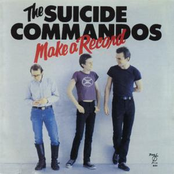Make a Record

Biography
Now known as "the Godfathers of the Twin Cities punk music scene," The Suicide Commandos were formed in 1974 when Chris Osgood and Dave Ahl asked Steve Almaas to join their new band, named after a 1969 Aldo Ray movie. Their creed was simple: play fast & loud, and have fun. By 1975, the band had begun to build a following at The Blitz Bar in the basement of The Roaring Twenties strip club in downtown Minneapolis. The following year, apparently unaware that such things were impossible, The Suici...
Now known as "the Godfathers of the Twin Cities punk music scene," The Suicide Commandos were formed in 1974 when Chris Osgood and Dave Ahl asked Steve Almaas to join their new band, named after a 1969 Aldo Ray movie. Their creed was simple: play fast & loud, and have fun. By 1975, the band had begun to build a following at The Blitz Bar in the basement of The Roaring Twenties strip club in downtown Minneapolis.
The following year, apparently unaware that such things were impossible, The Suicide Commandos managed to get themselves booked at the legendary CBGB's in New York City. After their successful "tour" of the East Coast in the spring of 1976, the band returned to Minneapolis to find that a venue right across the street from The Blitz Bar was looking for bands to play on their stage: The Longhorn. It proved to be an ideal match. The band was instrumental in creating the Longhorn scene, which also gave rise to other groups such as The Suburbs, Hypstrz, Curtiss A, NNB, and others. As the Commandos' reputation grew, they opened for national acts such as The Ramones, Iggy & the Stooges, and Cheap Trick.
The Suicide Commandos released two independent singles in 1976 and 1977 before they finally signed a national recording contract with Polydor's short-lived punk label Blank in 1977. Their debut album, Make a Record, was a success musically and in the Twin Cities, but failed to make much of an impact on the national music charts. The band also contributed three songs to Twin/Tone's compilation LP Big Hits Of Mid-America Vol. III.
In 1978, the group dropped “Suicide” from their name and added keyboardist Mark Goldstein for a time, moving their sound in a decidedly more pop direction. But by that summer, when The Commandos returned to Minneapolis from a short tour of the West Coast, they had the sense that they'd peaked and it was time to get out while the getting was good. They had achieved what they set out to do, turning a sedate and complacent music scene on its ear. So from November 22 to 24 of 1978, the Suicide Commandos - once again a threesome - played their last official shows together. At that point, it was clear the band was not going to release another studio album because Polygram had not renewed the group's second LP option. However, the best of those final live shows were preserved for posterity as The Commandos Commit Suicide Dance Concert, released in 1979 on the Twin Cities' own label Twin/Tone. All the Twin/Tone recordings are available on CD.
The Suicide Commandos reunited to play at the Minnesota State Fair on Sunday, August 26, 2007, along with Fountains of Wayne. Read more on Last.fm. User-contributed text is available under the Creative Commons By-SA License; additional terms may apply.
